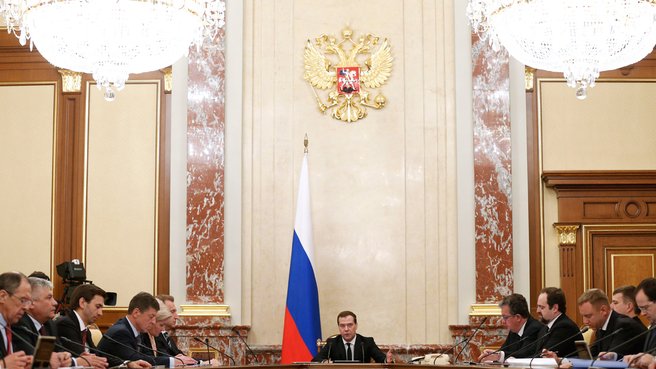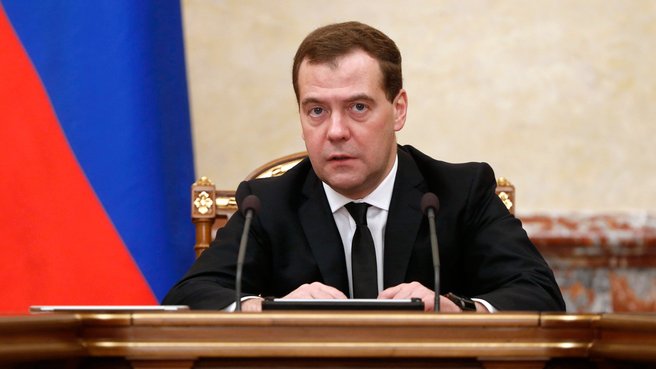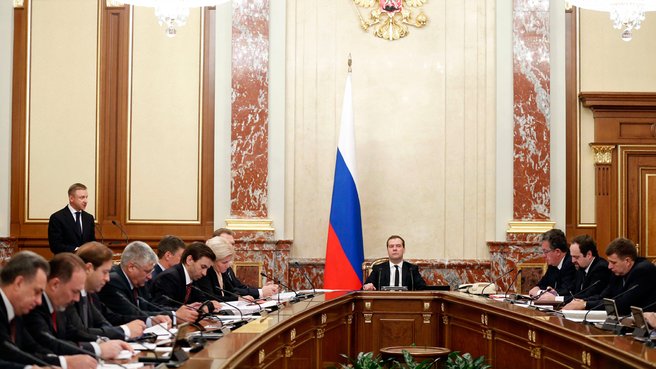The meeting focused on the implementation of a project to modernise regional education systems.
Dmitry Medvedev’s opening remarks:
We will begin our meeting today with discussing the modernisation of general education systems in the regions. We have been working on this for three years, since 2011. It is part of a comprehensive project to modernise the entire system of education starting from preschools and ending with university and post-graduate education. Our main goal is to create conditions for the development of our children and young people.
Our schools, no matter where they are located, should identify and help to develop our children’s talents, so that they become competitive in a knowledge-based economy and succeed in life.
Despite difficulties and economic rises and falls, we issued full-scale funding for modernising regional education systems, namely 120 billion roubles over the past three years, in addition to which over 28 billion roubles were provided from regional budgets. This is a great deal of money.
Dmitry Medvedev: "Despite difficulties and economic rises and falls, we issued full-scale funding for modernising regional education systems, namely 120 billion roubles over the past three years, in addition to which over 28 billion roubles were provided from regional budgets. This is a great deal of money."
We are working to provide modern equipment to schools, including computers and Internet access. In fact, we implemented this part of the project long ago. Maintenance repairs have been completed at nearly half, or approximately 21,000, of Russian schools, and 20% of schools have been rebuilt. In doing this, we paid special attention to rural schools, for understandable reasons.
Upgraded software has been provided to and computer-based education resources purchased for the majority of schools. Their internet traffic capacity has been improved, and new teaching aids have been sent to nearly all school libraries.
Dmitry Medvedev: "We have bought approximately 9,000 school buses to improve the transport accessibility of basic schools. One-quarter of schools provide distance education to nearly 70,000 pupils, including those with special needs."
We have bought approximately 9,000 school buses to improve the transport accessibility of basic schools. One-quarter of schools provide distance education to nearly 70,000 pupils, including those with special needs.
To be able to achieve these results, we had to change the work of teachers, who have greatly contributed to the positive changes underway at our schools. One of the priorities of the school modernisation programme was to promote the professional improvement of teachers and to pay them decent salaries. Two-thirds of teachers have attended advance training or retraining courses since the programme was launched.
Teachers must receive decent salaries, which was one of our goals. I am referring to the task of increasing teachers’ salaries to the average wage in the given region. Most regional authorities have fulfilled this task, although they have other drawbacks to take care of.
Dmitry Medvedev: "Compared to 2011, the average teacher’s salary increased by over 50% – actually, by 70%."
Compared to 2011, the average teacher’s salary increased by over 50% – actually, by 70%. Of course, this is an average figure, because the main task is to convince professionals to keep working, paying special attention to problem regions. This is a task for the Government and for the regions. Moreover, each professional should not only understand the formula for calculating their salary, but also be able to plan their professional growth.
Overall, we have created a reliable basis for the continued development of our schools. The regions will have to do this in accordance with the approved measures for the period until 2020. At the same time, we should develop different forms of education, strengthen the pedagogic element, and support inclusive education. All of this requires that teachers continue to improve their professional skills.
We have recently started to expand the network of kindergartens. Those children who are currently attending them will soon go to school, which means that we should deal with the remaining problems at schools, such as second and third shifts, and also build and equip new schools in accordance with modern standards.
It is a fact that most schools in Russia were built in the 1970s. Some of them need to be torn down or rebuilt, as I have said at a conference call and United Russia events. We should draft a programme of major school repairs and of the construction of new standard-design schools when major repairs are impossible or inadvisable. I suggest launching this programme after we finish with kindergartens. Let’s discuss possible principles for such a programme, make inspections of our schools, calculate possible costs, and discuss all our findings at a meeting on school education. The Minister of Education and Science will report on this in more detail.
Dmitry Medvedev: "We should draft a programme of major school repairs and of the construction of new standard-design schools when major repairs are impossible or inadvisable. I suggest launching this programme after we finish with kindergartens."
Today, we will also discuss a number of documents and federal laws, in particular on Russia’s accession to the Convention on the Conservation and Management of High Seas Fisheries Resources in the North Pacific Ocean. Russia is a major player in this sphere and should have the necessary regulatory basis and should be able to finance its operation.
We will also discuss the distribution of subsidies to agriculture, which is traditionally done at Government meetings. These subsidies are designed to help farms to adapt to the requirements of the World Trade Organisation. In this case, we will be discussing livestock breeding and the allocation of approximately 3.5 billion roubles. We will talk about what else should be done to ensure that these subsidies are used so as to achieve the desired result. The regions receive these funds on conditions of co-financing, which the Ministry of Agriculture should monitor. At the same time, some regions have serious debts that are hindering the implementation of a number of agrarian projects. We discussed this issue several times before, and we will also address it today, to a degree.
That seems to be all, though I’d also like to congratulate Vladimir Fortov, President of the Russian Academy of Sciences, on his birthday. Mr Fortov, we wish you health and success in your work. It’s good that you are here and not in Antarctica, but then, I think this international expedition came as a nice birthday present. It was a highly interesting undertaking. We wish you success!
<…>















